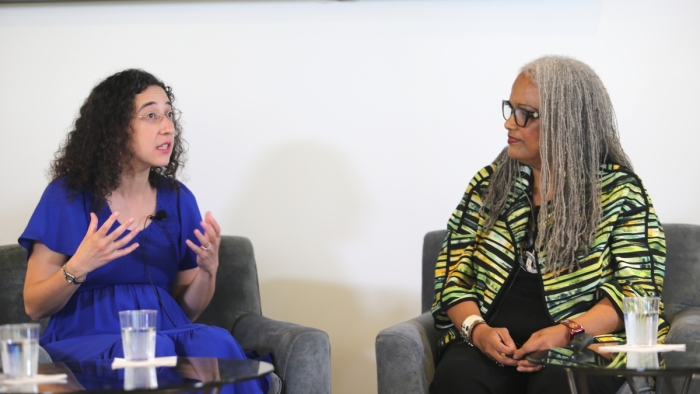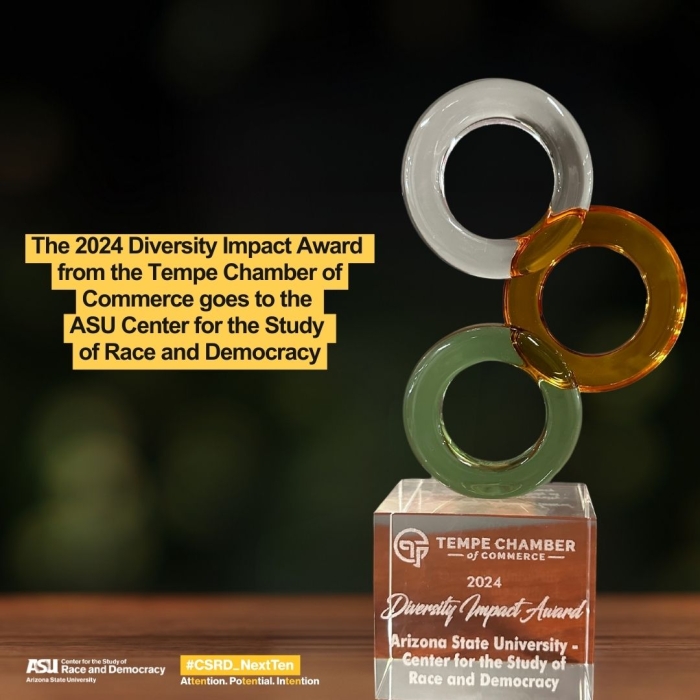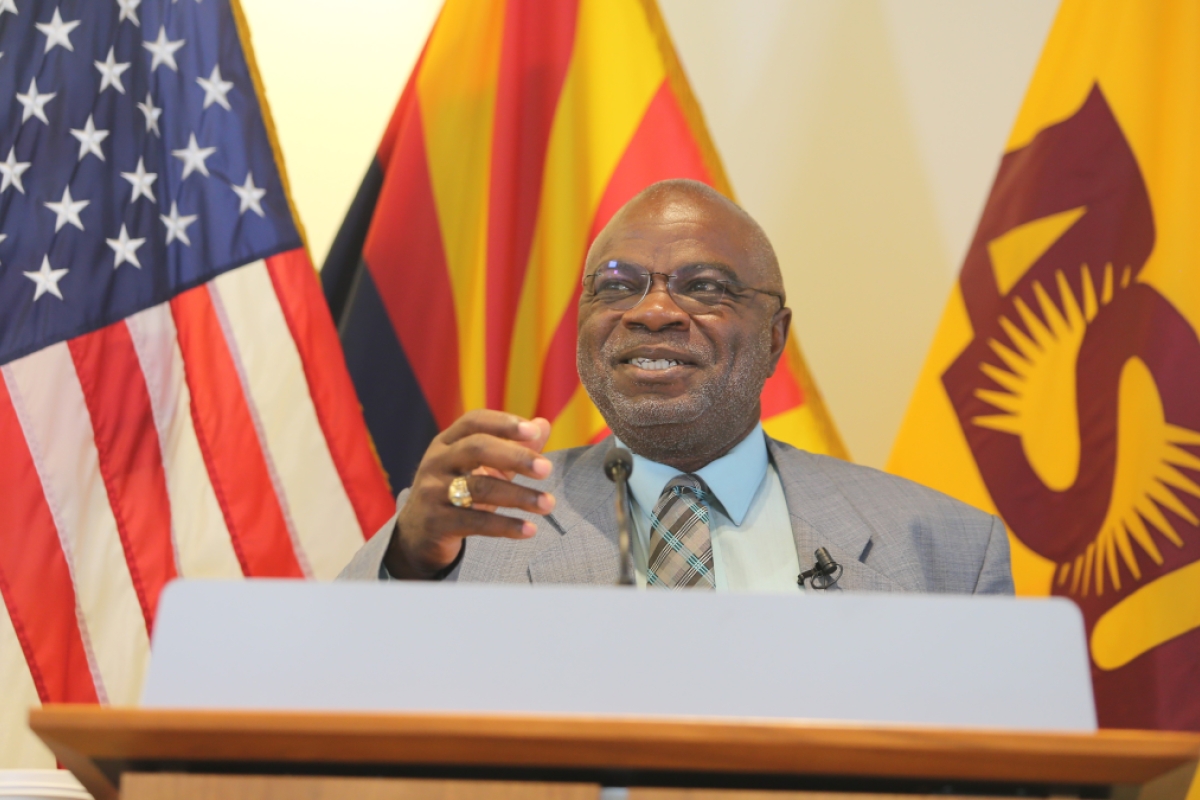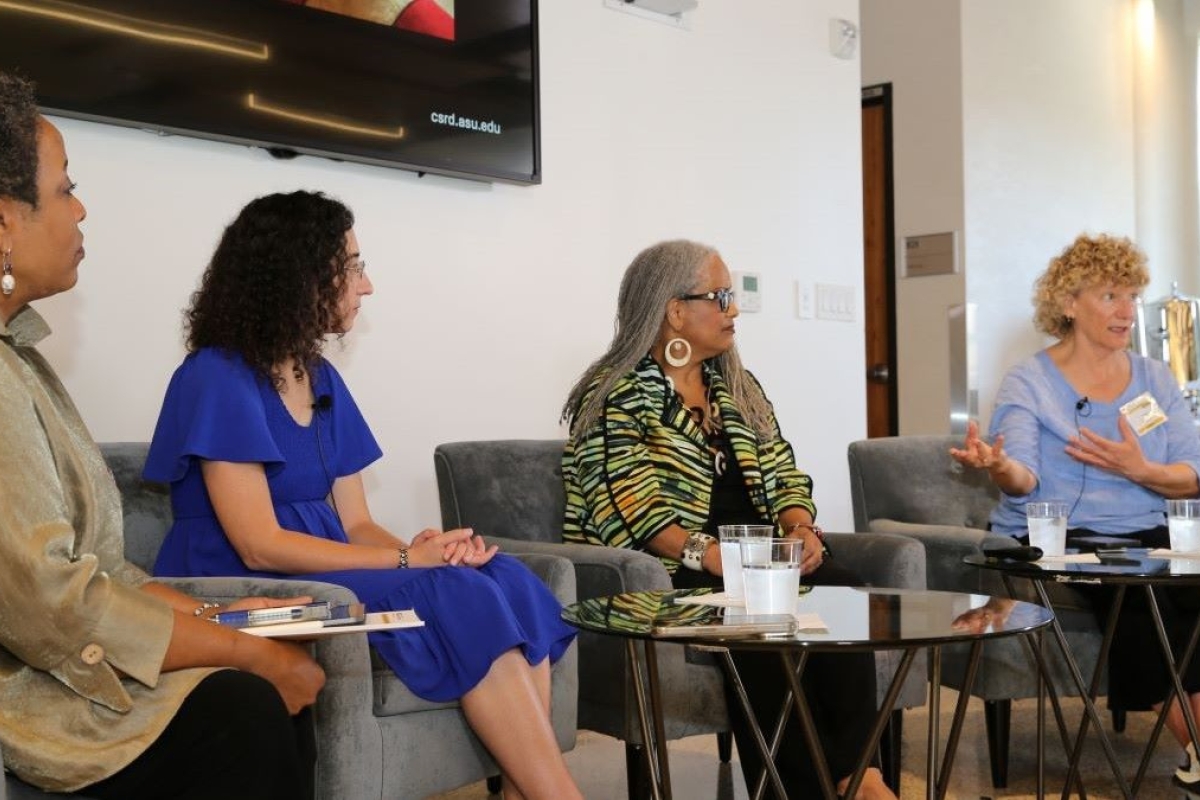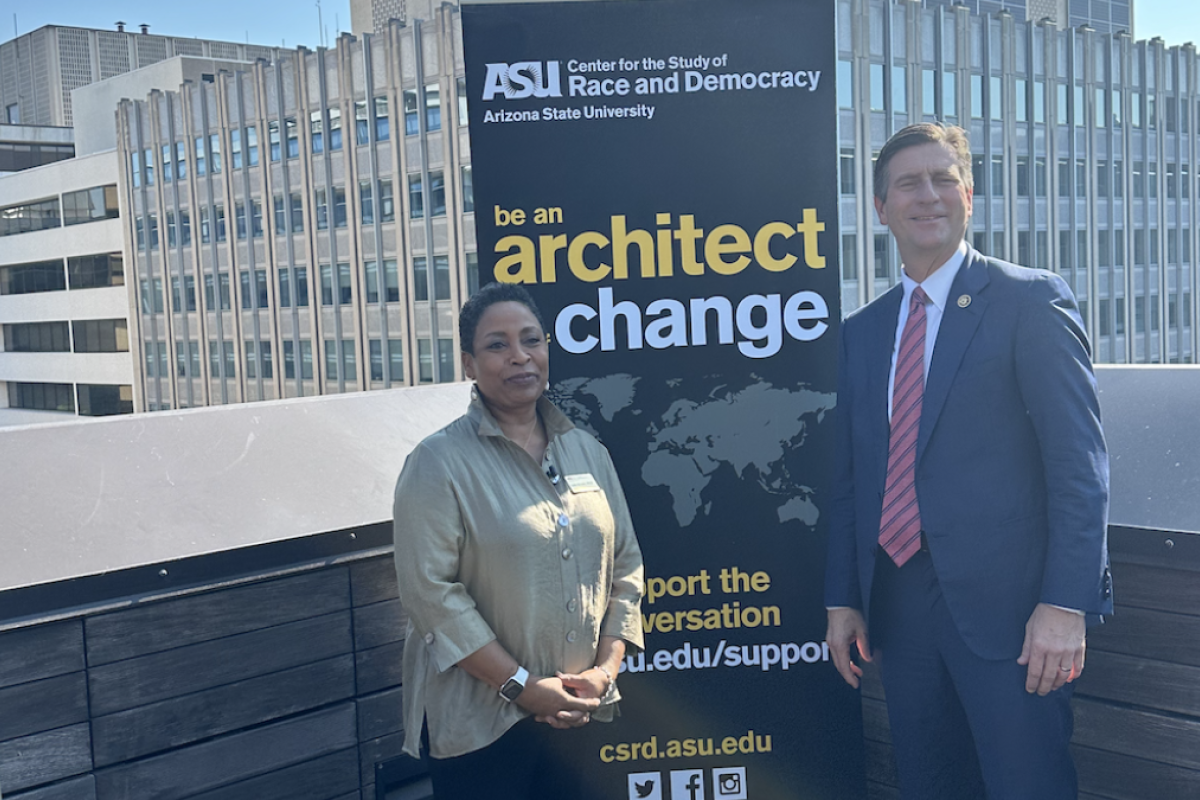ASU symposium connects race, place and civic genealogies
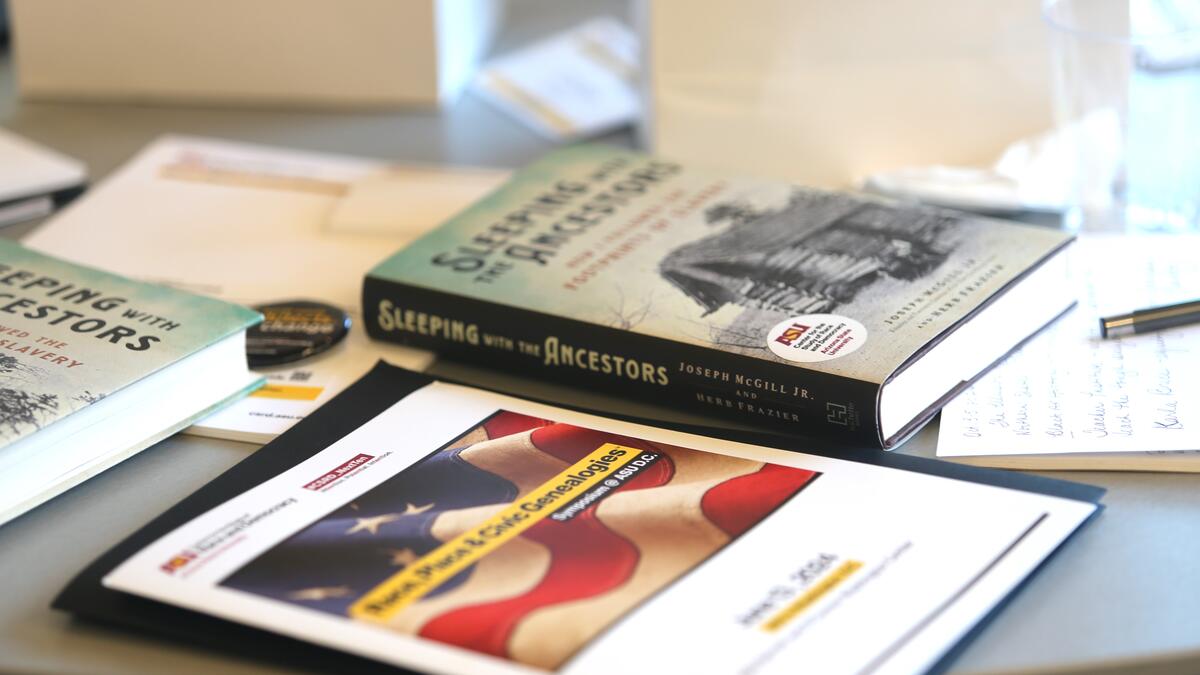
Attendees of the Center for the Study of Race and Democracy's recent Race, Place and Civic Genealogies symposium in Washington, D.C., received gift bags from ASU, including the book "Sleeping with the Ancestors" by keynote speaker Joseph McGill Jr., founder of The Slave Dwelling Project. Photo courtesy of Hager Sharp
For Phoenix-based civil rights leader Carole Coles Henry, uncovering the lineage of her ancestors has been a goal more than 50 years in the making. Her research, made difficult by the lack of genealogy records of enslaved people, eventually led her to a database created by reporter Julie Zauzmer Weil.
The database listed more than 1,800 U.S. Congressmen who were slaveholders. Among them was Walter Coles, who served in both the Virginia house of delegates and the U.S. House of Representatives – and who was a direct ancestor of Henry’s.
Henry searched the database, finding her own family history, and wrote Weil a letter to see if she had any additional information on the Coles. From there, a friendship was formed, and Weil ended up writing an in-depth article for The Washington Post about Henry and her ancestral connections to enslavement and freedom in Virginia.
After years of communication, Henry and Weil met in person for the first time at Arizona State University’s inaugural Race, Place and Civic Genealogies symposium in Washington, D.C.
The symposium, hosted June 13 by ASU’s Center for the Study of Race and Democracy, brought together scholars, journalists, artists, legal professionals and civil rights advocates to explore the deep-rooted connections between history, race, democracy and justice.
“I keep telling her, we’re kindred spirits,” said Henry during a symposium panel with Weil and The Washington Post editor Lynda Robinson. “This is my first time seeing her in this project — it’s been an amazing journey.”
Henry, the center's advisory board chair, captivated the room as she detailed her experience seeing the more-than-200-year-old plantation where her ancestors were enslaved for the first time.
“There was a spiritual connection that I had at that home,” Henry said. “I felt my ancestors were here and now here I am, hundreds of years later.”
Center for the Study of Race and Democracy wins Tempe Chamber 2024 Diversity Impact Award
This Diversity Impact Award celebrates leaders and organizations who have made significant contributions to the Tempe community.
The award represents a significant milestone for the center, reflecting its unwavering commitment to fostering inclusive and transformative dialogue about race and democracy. It acknowledges the center's efforts in supporting transformative scholarship, building robust partnerships and honoring ASU's dedication to academic excellence and accessibility.
Center Director Lois Brown thanked the Tempe Chamber of Commerce and its president Colin Diaz for the award and noted that the recognition fueled the center's commitment to keep doing its ambitious and well-received work. Brown encouraged all in attendance at the awards ceremony to have "the courage to keep doing what is necessary" and to "marshal the courage to keep learning more, to ask what else there is to know and to do what is necessary not just to be brave but to be present" when it comes to the vital topics of race and democracy.
Henry’s story is just one of many that were discussed at the symposium showing the complicated, often painful process of Black people learning about previously suppressed genealogies.
“This is a gathering that has been inspired by histories that have long been understudied,” said Lois Brown, director of the Center for the Study of Race and Democracy. “And today, we have an opportunity and also a responsibility to think deliberately about how race and place and genealogy will advance our collective understanding of democracy.”
The symposium’s keynote speaker, Joseph McGill, felt a calling similar to Henry’s. McGill is the founder and executive director of The Slave Dwelling Project, an organization working to enforce a more truthful recounting of America’s history by preserving Black slave dwellings across the country.
McGill travels to places where enslaved people lived and spends the night there, connecting historical sites with enslavement of Black people in order to shed light on how deeply slavery was entrenched in all parts of the country.
“Slavery, in my head in 1979, meant a slave cabin in a southern state,” McGill said. “I was missing a whole lot. … I was missing urban slavery. And I was also missing northern slavery, because in my mind, northern slavery didn't exist.”
According to McGill’s research, historical sites like Monticello include a more honest detailing of history in site tours than they did 10 to 20 years ago, but more still needs to happen.
“I do what I do because these enslaved ancestors were muzzled when they were here on this Earth, and we’re now their voices,” McGill said.
The daylong event featured remarks from Arizona Rep. Greg Stanton, as well as presentations, memoir readings and panel discussions.
“This is an important conversation, and this is the right place to have this conversation, here in the nation's capital,” Stanton said. “It's important that we take the time to reflect on how profoundly the horrors of slavery have shaped all aspects of our society to this day and led to injustices that continue to affect African American people throughout the United States.”
The symposium also addressed contemporary issues, such as reparative justice in the context of national and global racial violence.
“Reparative justice is more than compensation,” said Dreisen Heath, an advocate for racial justice who spoke at the symposium. “It’s a process of acknowledging historical wrongs, restoring relationships and reclaiming identities and heritage."
Tijuana Phelps Jackson, an Impact Arizona Fellow with the Center for the Study of Race and Democracy, called attention to the upcoming Juneteenth holiday, which acknowledges the two-year delay of emancipation for an estimated 250,000 enslaved children, women and men in Texas.
“Juneteenth is a powerful reminder of the resilience and perseverance of our ancestors,” Phelps Jackson said. “It is a day to celebrate freedom and renew our commitment to justice and equality. Attention to understudied and underestimated histories enables us to better honor the hundreds of thousands enslaved in America and for whom justice and equality was long denied.”
Henry echoed that sentiment: “There are aspects of this history that are not so positive, and I believe a lot of that needs to be recorded and shared, because this is American history,” she said. “This is not just the Black or African American experience. It belongs to all of us.”
This story was written with contributions from Hager Sharp and Debbie Richmond.
More University news

ASU on the cusp of becoming a $1B research university
Once a fledgling research school, Arizona State University soon will hit $1 billion in annual research funding, placing the university into a rare category reached by just 33 universities across the…
ASU tops $900 million in research expenditures
For the past decade, Arizona State University has been climbing the ranks as one of fastest-growing research universities in the world. One key measuring stick is the National Science Foundation’s…

ASU names 3 Regents Professors for 2025
Three Arizona State University professors are being honored with the highest faculty award possible — Regents Professor.The three are internationally recognized experts at the top of their fields,…
